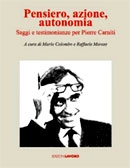With the disastrous market reaction to his last bailout plan, Hank Paulson is now preparing to ratchet up the rescue by pouring capital into frightened financial institutions in return for equity shares. The intent is to sell back the shares as soon as the firms get back on their feet. Not so fast. The
The Treasury has announced it is outsourcing most of the management of the $700 billion package to big Wall Street firms. As galling as it is to see the arsonists put in charge of the fire department, there is little alternative.
Two decades of systematic privatization and deregulation has depleted and demoralized the civil service to the point where the government does not have the in-house capacity to do the job. In 1992 there were some 20,000 federal employees -- lawyers, economists, auditors, etc -- working on regulatory oversight. By 2006, after the huge expansion and increased complexity of financial markets, there were about
But even with more people, the government cannot effective regulate from outside the vastly complex and opaque world of modern finance. When the Bush regulators (yes, I know, an oxymoron) finally began to smell smoke last year, the agency staffs were completely mystified as what had been going on. Not only did they not know where the financial bodies -- the rotten mortgages, the disappeared collateral, and the bogus guarantees -- were buried, but they did not have any idea how they disappeared and who was next. All their information came, and still comes from, the banks and brokers themselves, whose lies and mutual deceptions had fueled the overheated markets in the first place. As a result, the government has consistently underestimated the seriousness of the crisis. One reason the markets have not responded to the Treasury bailout and the Federal Reserve's guarantee of the commercial credit market is that investors are not convinced that these agencies know any more than they do.
So, on the desperate theory that it takes one to know one, the Treasury has now turned to the criminal class itself to ferret out the real value from the wreckage of financial assets and hope that self-dealing and fraud are kept to a minimum. Good luck.
The manipulation of the finances of electric utilities was a prime cause of the crash of 1929 that led to the great depression. Out of those scandals came the idea of having publicly owned utilities -- the Tennessee Valley Authority was the prime federal model -- as a "benchmark" so the government could judge and monitor the performance of investor-owned utilities. Even with the massive privatization of the energy sector, states like
A federal bank could perform a similar function. Operating every day in the credit markets, it would be a real world window on what it going on. Because of its public nature the government bank would be transparent and its executives would be paid modestly and on salary, rather than the bonus system that encourages short-term recklessness. Perhaps most important, it would be a training ground for the new era of high quality, dedicated public servants that are absolutely necessary if we are going to avoid repeating this disaster.
Yes, the bank will be more bureaucratic -- cautious, less "innovative", less likely to take risks. It would therefore a model of what banks and bankers used to be before they became macho masters of the financial universe -- or what's left of it.
(Jeff Faux was founder, and is now Distinguished Fellow, of the Economic Policy Institute. His latest book is The Global Class War).



